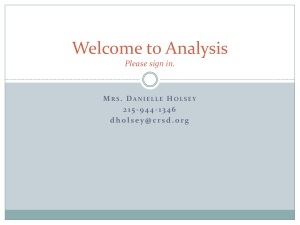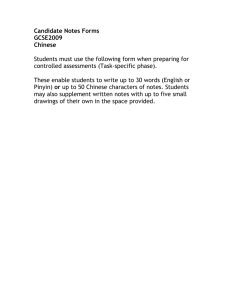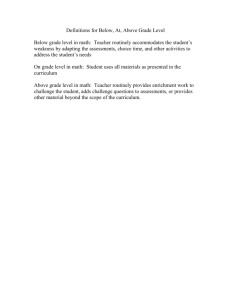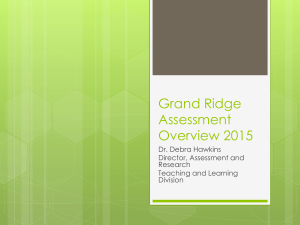PTDC Session4 F12
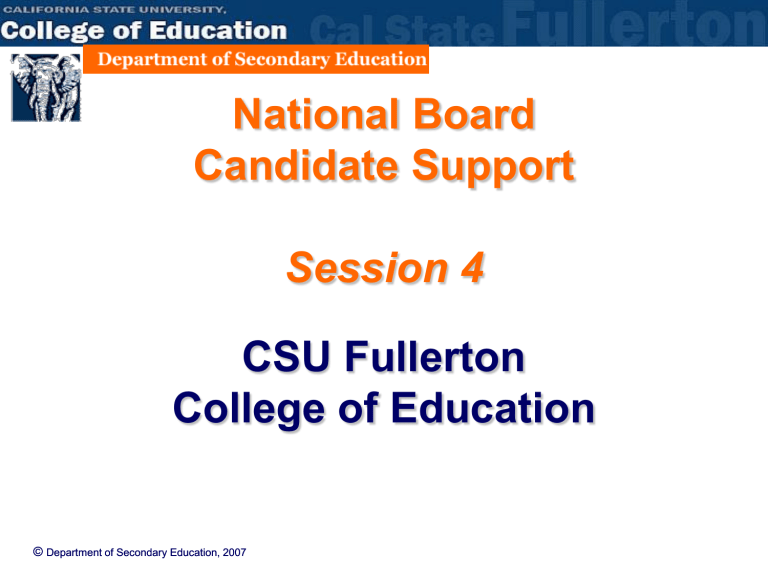
National Board
Candidate Support
Session 4
CSU Fullerton
College of Education
©
Department of Secondary Education, 2007
Parameters for Candidate
Support
• CSPs will
– be available via e-mail to read entries and respond to questions
– read written work ONLY once
– ask questions to focus your entry, but not serve as editors
– act as facilitators, but not as instructors, mentors or evaluators
©
Department of Secondary Education, 2007
Parameters for Candidate
Support
• Candidates will
– make connections within your group, and exchange contact information
– collaborate and support one another
– consult the www.nbpts.org or
1-800-22-TEACH
©
Department of Secondary Education, 2007
Sources of Evidence of
Teacher’s Performance
• Samples of student work
• Assessments
• Videotapes of classroom practice
• Documentation of accomplishments outside the classroom
©
Department of Secondary Education, 2007
Analyzing Student Work as
Evidence
Refer to:
• Specific instructions for each entry
• “Format Specifications,” provided for each entry
• Scoring guide for each entry
• Chapter 5 from Understanding
National Board Certification
©
Department of Secondary Education, 2007
Evidence Student Work
Provides:
• What students are asked to do.
• How student responses are interpreted by the teacher.
• What the teacher does with the information provided by the student work.
©
Department of Secondary Education, 2007
What is “quality” evidence?
• Evidence should relate to the stated learning goal/objective
• Evidence should be specific – focus when possible on what
students say, do, write, draw, ask
©
Department of Secondary Education, 2007
Student Work Analysis
Analysis of Instruction and Student Work
AYA ELA
–Danielle’s responses show she is able to analyze, understand, and appreciate texts. She writes in her journal how the book My Darling My Hamburger relates to a moral struggle
.
©
Department of Secondary Education, 2007
Student Work Analysis
Analysis of Instruction and Student Work AYA ELA
Danielle’s responses show an independent reader who is able to analyze, understand and appreciate different texts. For example,
Danielle shows understanding an appreciation when she writes that My Darling My Hamburger was “a great book with the emphasis on moral decisions and their effects.” Previously in her journal she stated “I think that Sean made the right decision by not marrying Liz. Not only were they both too young and still in school, but they would have a baby to care for and support also.”
Danielle is not only showing her understanding of the text, but also she ties her journal entry to the major emphasis of the unit
MC GEN Entry 2
Thematic Exploration: Connection to
Science
-In the first assignment Darryl follows the scientific process. It is apparent that he has a good understanding as he moves through the process and by his strong concluding hypothesis
©
Department of Secondary Education, 2007
MC GEN Entry 2
Thematic Exploration: Connection to Science
In the first assignment (observation of the water cycle) Darryl follows the scientific inquiry process. It is apparent that he has a good understanding as he moves through the process and by his strong concluding hypothesis. He articulates very well both the concept of the water cycle and how it was modeled in the experiment and the big idea of change in the cycle. An example of this is in his concluding hypothesis when he summarizes the process by stating, “the water vapor condenses…cooler air makes a cloud…water vapor accumulates…water droplets grow in size and become too heavy for the cloud…then precipitation is formed.”
©
Department of Secondary Education, 2007
What to Submit
If student work or material is
(a):
Piece of writing in any genre or form
Three-dimensional
Song
Film or Video
Oral Discourse
Software
©
Department of Secondary Education, 2007
Submit a:
Clear copy or original
Photograph
Written copy
Transcript and/or storyboard
Transcript
Written description and screen prints
When Choosing Student Work,
Consider the Following
• The purpose of student work is to understand evidence provided in the written commentary.
• Emphasize quality over quantity.
• Choice of student work varies from one entry to another.
• What kinds of things about teaching practice can and can’t be seen in student work.
• Assessors are reading for evidence.
©
Department of Secondary Education, 2007
Tips to Remember
• Follow requirements in the “Format
Specifications.”
• Submit only the number of student work samples required by the entry.
• Show only student’s first name to ensure anonymity.
• Consult each entry for page limits.
• Include samples that are most important in your certificate area!
©
Department of Secondary Education, 2007
The Bottom Line is That:
Student work presented as evidence should reflect clear connections between stated goals, accomplished teaching and student learning.
©
Department of Secondary Education, 2007
Entries Featuring
Assessment
Selecting students:
You should select at least six students as potential cases and collect or make copies of the assessments and the students’ responses. Only two or three of these will be chosen to analyze.
Selecting Assessments:
The assessments should be appropriate to the task and learning objectives to which they are matched.
©
Department of Secondary Education, 2007
More about Assessments and Student Responses
• The assessment may be the same for each student.
• It may be formal or informal, but at least one of the assessments should be something produced by the student, although it does not necessarily have to be written.
• The assessments may be given in any mode
(unless specified in the format specifications), and the responses may be collected in any mode, drawings, art, projects, models, presentations, essays, cloze exercises, tests, and others.
©
Department of Secondary Education, 2007
Student work regarding assessment should show growth.
©
Department of Secondary Education, 2007
Wrap-up
• Parking Lot Questions
• Next Session
“Effective Reflective Practice”
©
Department of Secondary Education, 2007

